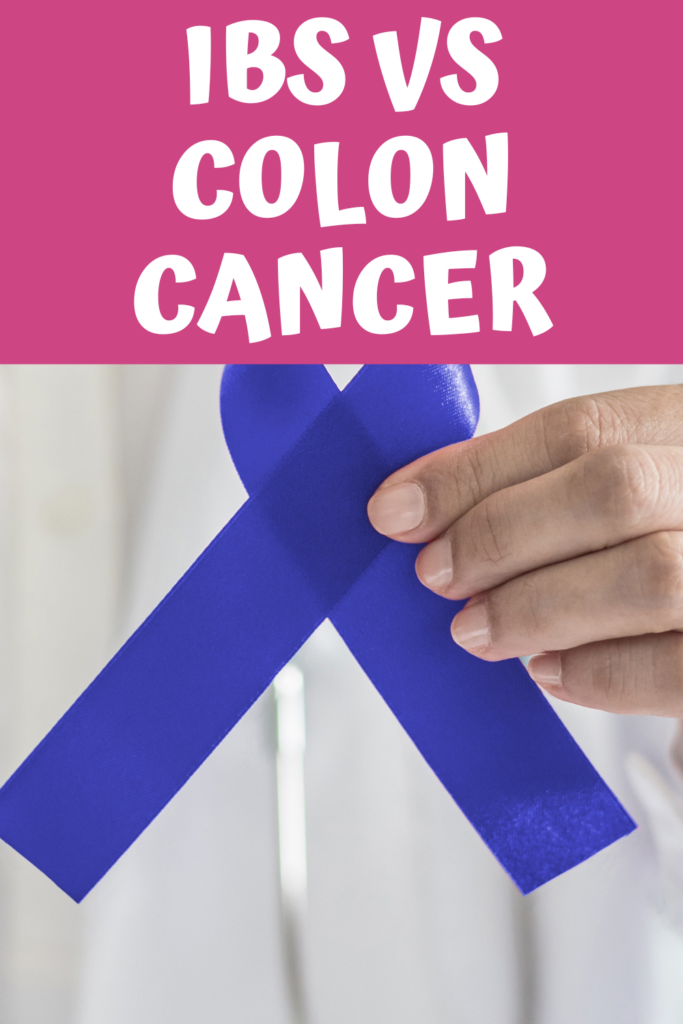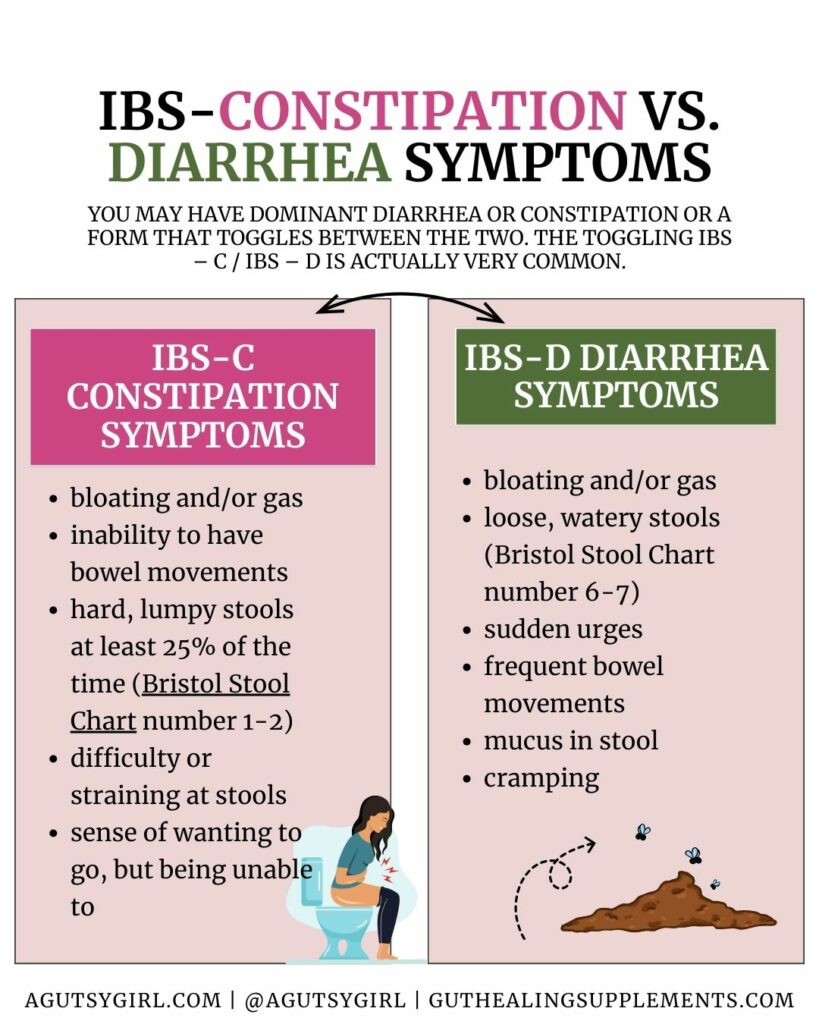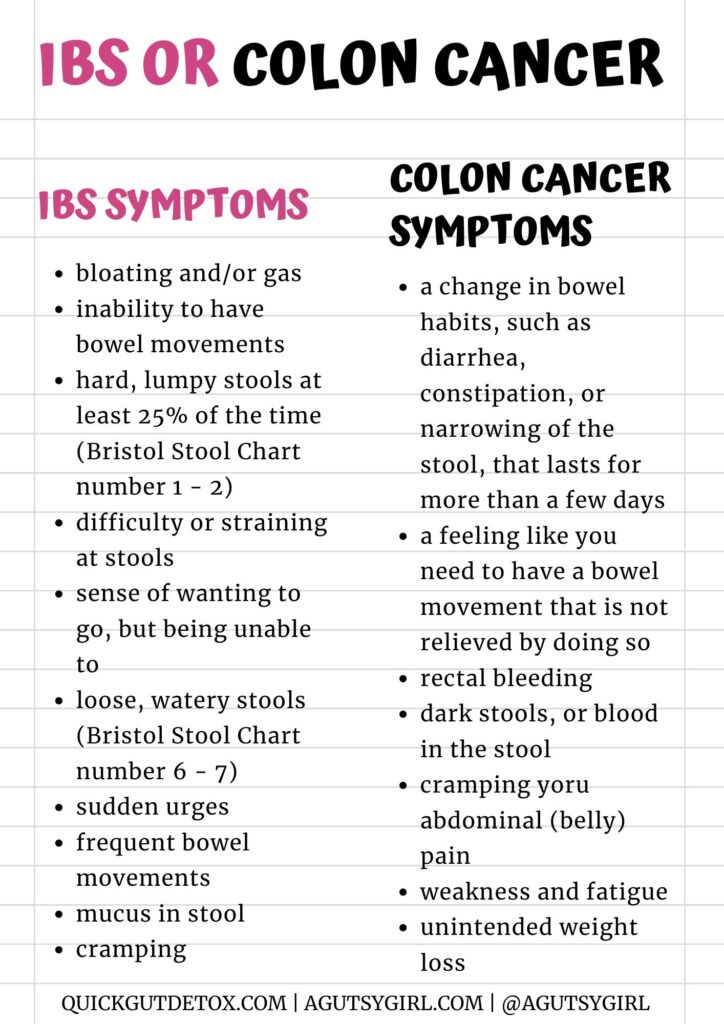Not to scare you with this title, but the fact remains: people are actually searching IBS vs Colon Cancer. And they are searching it a ton.
It’s World Cancer Day, so this is the unavoidable Gutsy topic we’re digging into.
IBS vs Colon Cancer
Click HERE to save this post for later.

Here’s the problem with the IBS or Colon Cancer question: they present with similar symptoms.
How I know this?
Well, for YEARS my dad was told, “It’s just IBS.”
He never had a regular screening, but always had digestive issues and all the risk factors were there.
Spoiler alert: My dad died from Colon Cancer in August of 2019.
So today, it’s very important that the differences (and similarities) between IBS and Colon Cancer; early detection can save your life!
What is IBS?
IBS stands for Irritable Bowel Syndrome. It is classified as a syndrome, not a disease.
Most people with IBS will never develop IBD (inflammatory bowel disease like ulcerative colitis and crohn’s disease) , but most people with IBD have IBS symptoms, which is why I always say IBS and/or IBD.
IBS is known as “spastic colon,” and since it’s a syndrome it’s just a set or range of symptoms that may fall into the defining category, Irritable Bowel Syndrome.
IBS, unlike IBD, does not cause tissue inflammation. In other words, if you were to be ‘scoped,’ doctors would not find tissue inflammation, scarring, etc. from IBS alone. (However, if you were scoped and did have a form of IBD, you would discover that. It would not be a pleasant finding, but critical.)
Even though there is no permanent damage done with IBS and your doctor would not find abnormal cells changes, it still can cause day-to-day pain, discomfort and misery for those who battle it.
This is why I never say “it’s just IBS.” And that’s also why I always put “just” in quotation marks.
I see your pain.
According to the International Foundation for Functional Gastrointestinal Disorders, IBS affects at least 10% to 20% of adults in the U.S. — mostly women — and is second only to the common cold as a cause of absenteeism from work. (source)
(And now you know why I’m so passionate about helping women in particular!)
Finally, and this is something that people overlook all the time, but for which I’ve set out to help with because it’s exactly what happened to me!
IBS usually begins in late adolescence or early adult life — most often at times of emotional stress. Source
IBS Symptoms

Everyone is different, namely because some have the IBS-C (constipation) version and others have the IBS-D (diarrhea) version while others have the alternating version which includes both constipation and diarrhea.
This is a compilation of symptoms of Irritable Bowel Syndrome for both IBS – C and IBS – D as documented via What is IBS-C and D.
- bloating and/or gas
- inability to have bowel movements
- hard, lumpy stools at least 25% of the time (Bristol Stool Chart number 1-2)
- abdominal discomfort
- difficulty or straining at stools
- sense of wanting to go, but being unable to
- loose, watery stools (Bristol Stool Chart number 6-7)
- sudden urges
- frequent bowel movements
- mucus in stool
- cramping
And remember, while these are common symptoms of IBS they are not normal.
What is Colon Cancer?
Colorectal cancer is a type of cancer that is formed from polyps in the colon, otherwise known as the large intestine.
The Cleveland Clinic states,
Your colon wall is made of layers of mucous membrane, tissue and muscle. Colon cancer starts in your mucosa, the innermost lining of your colon. It consists of cells that make and release mucus and other fluids. If these cells mutate or change, they may create a colon polyp.
These polyps (or small bundles of cells) are initially harmless but can turn cancerous if not detected in time.
They grow on the lining of the colon and can become further inflamed, leading to dangerous and potentially fatal outcomes and you have an increased risk of Colon Cancer.
One great thing about colon cancer that Dr. Zuri mentioned in the podcast episode we recorded together is that it is both PREVENTABLE and TREATABLE if caught on time.
However, it can be hard to distinguish if your symptoms are due to this condition or not, due to their rather vague nature.

Colon Cancer Symptoms
According to the American Cancer Society,
Many of the symptoms of colorectal cancer can also be caused by something that isn’t cancer, such as infection, hemorrhoids, irritable bowel syndrome, or inflammatory bowel disease.
And here are some of those symptoms of colon cancer:
- A change in bowel habits, such as diarrhea (chronic diarrhea), constipation, or narrowing of the stool, that lasts for more than a few days
- A feeling that you need to have a bowel movement that is not relieved by doing so
- Rectal bleeding
- Dark stools, or blood in the stool (bloody stools)
- Cramping or abdominal (belly) pain
- Weakness and fatigue
- Unexplained weight loss
Unfortunately, oftentimes, the symptoms as outlined above don’t fully show up until the Cancer has been diagnosed.
This is why, if you have a family history of the disease and/or have been dealing with “IBS” symptoms for a long time, it’s a good idea to seek further testing and answers.
IBS is IBS is….
Gertrude Stein wrote, “A rose is a rose is a rose.”
I know you think I’m much cooler now that you know that not only was I part English major, (yeah, you’d never know it on this website sometimes, though!) but within the English portion it was Poetry I studied.
I tend to revert back to the Stein-ian words frequently: a rose is a rose is a rose.
And IBS is IBS is IBS.
In other words. while doctors do make the IBS diagnosis every single day, it’s not truly a diagnosis.
Irritable Bowel Syndrome is a term given to those with a set of symptoms who have not been diagnosed with anything else….yet.
The yet is key here.
I’ve never met someone who was diagnosed with IBS and, if they continued seeking answers, did not arrive at a more formal and accurate diagnosis.
Please don’t misunderstand this as me saying, “If you have IBS, it’s probably Colon Cancer.”
Not by any definition is that what I’m referring to.
What I am saying is that IBS is very non-specific, and more often than not, the symptoms are just potential warning signs that there is more to the story.
According to Yale Medicine younger people are given the Colon Cancer diagnosis in recent years,
Nobody in their 20s, 30s or 40s gets colorectal cancer, right? Wrong. The truth is that colorectal cancer is on the rise in young adults and has been for years. That’s why Yale Medicine surgeons who treat it are urging people younger than 45—even college students—to talk to their doctors about any suspicious symptoms, such as constipation, rectal bleeding, or sudden changes in bowel movements.
IBS and Colon Cancer
Although a primary concern of IBS patients is their potential risk of developing colorectal cancer (Rey and Talley, 2009), few studies have evaluated the long-term course of IBS.
However, HERE is a study that took it on.
Their conclusion was as follows:
We found a decreased risk of colorectal cancer in the period 1–10 years after an IBS diagnosis. However, in the first 3 months after an IBS diagnosis, the risk of colon cancer was more than eight-fold increased and the risk of rectal cancer was five-fold increased. These increased risks are likely to be explained by diagnostic confusion because of overlapping symptomatology.
This was my point.
It’s not an inverse relationship, but there is a relationship.
Even when presenting with colorectal cancer symptoms, without a Colon Cancer diagnosis, I’d guess that almost every single person with Colon Cancer has (or would be told they have) IBS.
But also without a Colon Cancer diagnosis, every single person who has IBS (or told they have it) does not necessarily have Colon Cancer.
This is why being proactive with your healthcare provider and getting the appropriate tests is critical.
Literally, it could be the difference between life and death.
And in case you want to read more about this, check out Colon Cancer Stage 4.
Colon Cancer Testing
Unless you have very specific Colon Cancer signs and symptoms and are at a higher risk for it (due to lifestyle and/or a family history of colon cancer), I don’t think you need to assume you have it and get the exact Colon Cancer tests immediately.
There are so many other gut health tests to start with.
Yes, it’s confusing. Here are some sources I have to help get you started:
But if you want to test for Colon Cancer, here are the options (as provided by the American Cancer Society)
p.s. Consider trusting the American Cancer Society website for stats and testing options; not food and lifestyle, mmmmmkay?!
Stool Tests
- Fecal immunochemical test (FIT) and guaiac-based fecal occult blood test (gFOBT)
- Stool DNA testing (see below)
Visual Tests
- Colonoscopy. Do not be afraid of this one. Read: The Colonoscopy and Endoscopy and Top 30 Colonoscopy and Endoscopy Tips, Tricks, and Information.
- CT colonography (also called virtual colonoscopy)
- Flexible sigmoidoscopy
Cologuard Test
The Cologuard test is a non-invasive stool DNA test.
According to the Mayo Clinic,
The stool DNA test looks for abnormal DNA associated with colon cancer or colon polyps. The test also detects hidden blood in the stool, which can indicate the presence of cancer.
NOTE: In good faith, I cannot fully recommend this one, as I’ve heard it debated in great detail.
Metastatic Colon Cancer
Upon testing, in the event that the cancer was not caught early on, Metastatic Colon Cancer can be the diagnosis.
If this is the diagnosis given, that means the cancer has spread beyond the colon.
In that instance, the cancer is advanced and usually at stage IV.
Guess what? I don’t need to research anything about Metastatic Colon Cancer.
I know exactly what it is, what it means, and what it feels like the moment you’re told a loved one has it.
And it’s awful.
So guess what? You must do something today.
Do Something!
I don’t care what you do, but if you’ve been having massive digestive system problems, you have to do something.
Consider it your red flag!
If you’ve been given the IBS diagnosis, but you think the IBS diagnosis is just BS, run with that GUT FEELING.
The good news is that a key factor in Colon Cancer is early detection.
You know your body better than anyone else…..new symptoms that are alarming are definitely worth getting checked out.
It doesn’t matter if it’s IBS, Colitis, Crohn’s, Celiac, SIBO, GERD, or even Colon Cancer, arriving at the right answer ASAP is critical.
Questions? Ask away.
If you liked this post, you might also enjoy:
Xox,
SKH
🤰 bloating be gone! weight loss through optimal gut health for women
💃ʜᴇᴀʟ ʏᴏᴜʀ ɢᴜᴛ. ʜᴇᴀʟ ʏᴏᴜʀ ʟɪfe.
🫶🏻 founder gutbyome.com



![Q&A 5 with A Gutsy Girl [Episode 29: Colitis, GAPS Diet, Healing Mindset, and more]](https://agutsygirl.com/wp-content/uploads/2022/02/episode-29-podcast-featured-agutsygirl.com_.png)



